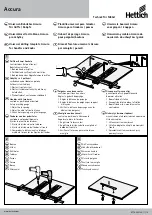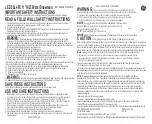
BT24i CO
2
Gas Sensor User’s Guide
|
3
having a CO
2
concentration of about 400 ppm. While still outdoors insert the sensor with the
rubber stopper into the bottle. You can now take the bottle and the sensor to the location where
the measurements will be done.
•
Connect the CO
2
sensor to an interface.
•
Let the sensor warm up by collecting data for at least 90 seconds.
•
When the readings are stabilized use a paper clip or a ballpoint to press down the calibration
button. After about 30 seconds, the reading should stabilize at a value of approximately 400 ppm
(±40 ppm).
•
If the reading is significantly lower or higher than 400 ppm, simply press the button again to
repeat the process.
Collecting data
1.
Connect the sensor to your interface and let it warm up for at least 90 seconds to assure a stable
voltage.
2.
You can use the sampling bottle to collect air samples.
3.
Calibrate your sensor by using its calibration button. See the calibration procedure above.
4.
Start your measurement. The sensor takes a measurement reading about every 5 s (the intensity
of IR changes).
5.
Even though the sensor responds rather quickly to changes in CO
2
concentration, remember that
gas has to diffuse through the holes in the sensor tube before any changes in concentration will be
detected. Since diffusion of gases is a fairly slow process, there is a resulting delay in the readings.
Practical information
•
The sensor requires a large current (120 mA). We recommend that you use the power adapter for
data-‐loggers. Only one CO
2
sensor can be used at a time.
•
The sensor cannot take readings at CO
2
concentration higher than 5000 ppm. Once the CO
2
concentration reaches this level the computer will continue to display a reading of 5000 ppm, until
the actual level drops below 5000 ppm again.
•
The sensor is designed to operate between 20°C and 30°C. The sensor can be used outside of this
temperature range; however there will be a loss in accuracy of readings, even if the 1-‐point
calibration at the lower level or higher temperature is done. Allow enough time for the sensor to
stabilize at the desired operating temperatures.
Suggested experiments
•
Measuring CO
2
levels (respiration) from small animals and insects.
•
Monitoring CO
2
changes in a plant terrarium during photorespiration and photosynthesis in
light/dark (combination with the light sensor).
•
Measuring CO
2
levels during cellular respiration of peas or beans.
•
Monitoring production of CO
2
during chemical reactions.
•
Measuring CO
2
levels in classroom






















